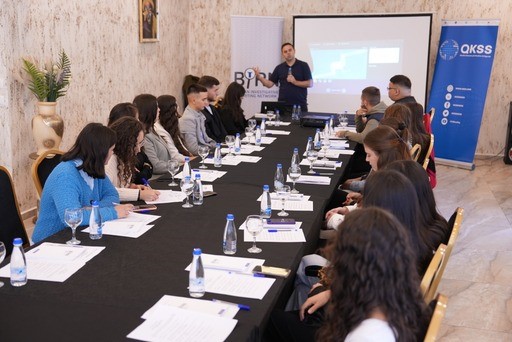26/09/2024

The Kosovar Centre for Security Studies (KCSS) and the Balkan Investigative Reporting Network (BIRN Kosovo) held a training session for around 20 students in South Mitrovica. The training, held on September 23, 2024, aimed to equip students with the necessary knowledge and tools to identify and combat disinformation, especially narratives originating from Russia, China, and ideologies based on religion.
The training brought students together to address the complex nature of disinformation. It was divided into two parts: one focusing on foreign influences, particularly Russian and Chinese disinformation, and the other on religiously-based disinformation, which often targets vulnerable communities in Kosovo.
Visar Prebreza from BIRN Kosovo led the first discussion on Russian and Chinese disinformation. He explained how foreign powers, particularly through Kremlin-run media and state-controlled Chinese outlets, have disseminated deceptive narratives that impact local perceptions in Kosovo. Prebreza also highlighted the challenges that Kosovo's media face when addressing such disinformation. He guided participants on key elements for identifying false narratives and provided examples of how these tactics unfold in Kosovo’s media landscape.
Skënder Perteshi from KCSS conducted the second part of the training, focusing on how extremist religious groups use disinformation as a tool to spread radical ideologies. Perteshi's presentation highlighted the various strategies employed by these groups, including targeting specific audiences with narratives designed to undermine secularism, democracy, and the rule of law in Kosovo. He also explored the broader strategic objectives of radical religious actors and how their disinformation campaigns aim to divide communities. The session concluded with practical advice on how to build positive counter-narratives against disinformation and promote unity.
The training served as a critical platform for students to engage directly with experts and discuss the role of media education in defending against disinformation. Both Prebreza and Perteshi emphasized the importance of involving youth in creating communities capable of identifying and responding to false information.
This training was organized by KCSS and BIRN Kosovo as part of the project “Raising Public Awareness on Russian, Chinese, and Religious Disinformation and Equipping Journalism Students and Journalists with the Necessary Skills to Identify, Analyze, and Combat Disinformation,” supported by the Digital Activism Program by TechSoup Global.